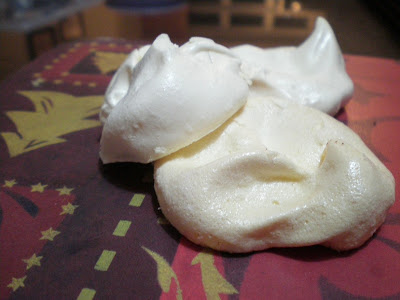
I have always loved our National Microwave-Cum-Convection Oven and Grill. Thanks to its ability to morph from a microwave (defrost, reheat) to a very effective convection oven that has yet to let us down when it comes to baking. We usually baked cakes tray by tray. Its small size or single-tier limitations never bothered me. In fact, I thought it was a great space saver.
Until now.
Introducing - meringues! They promise to taste like snowy clouds of sweetness. And they would make good use of the leftover egg whites from the sugee cakes we made earlier. Mum usually throws them out This year I thought I'd make something out of them - and this seemed like the perfect recipe - all I needed was superfine sugar (easy-peasy - just process caster sugar till fine), cream of tartar, vanilla and I was set to go.
I decided to go with a recipe from the Joy of Baking. JoB recommends approximately 50g of sugar per egg white used. After making the meringues, I should have scaled down the amount of sugar I used by a quarter. After all, this is an American recipe. Maybe they have eggs the size of tennis balls. Maybe we have more sensitive tastebuds.
But the real challenge came when baking them. The original recipe calls for 3 egg whites, I was using seven. And it calls for slow baking in a low oven (1 1/2 to 2 hours).
With our faithful National, usually so wonderful with cakes, this was a real challenge. All in all I baked 7 or 8 trays, and it ended up, hands down, being the longest baking session I ever encountered. Since brilliant old me started prepping at 9 at night, I ended up going to bed at 5 in the morning, and that is after I turned the temperature up by 10 deg C. That resulted in a caramelly colous instead of the brilliant white.
I also tried my hand in piping out the mixture but they just ended up looking like turds. well, luckily I found it funny or else I would have been really demoralized. But they looked so comical that I was laughing too hard to feel so.

Behold - the results of my less-than-stellar piping skills
I ended up using 2 eating spoons to dollop the mixture onto my baking sheets - far from pretty but, erm, acceptable (I do so hope).
And after all that effort, they really were tooth-achingly, turn-off sweet. Pity, because we loved the light and airy texture. I really don't feel like re-trying this recipe because of the long baking time. Plus, thanks to our equatorial humidity, the meringues kinda got sticky after a bit of handling out of their airtight container. Maybe it was because I did not dry them out in the oven overnight (no space for all of 'em).
Verdict: unless I have a bigger oven in which many large trays can enter, I really won't be trying this again anytime soon. But hey, never say never, right? Chocolate meringues, perhaps, with some cocoa powder, sifted then folded in??
Meringue Cookies (from JoyofBaking.com)
3 large egg whites (3 ounces or 90 grams)
1/4 teaspoon cream of tartar
3/4 cup (150 grams) superfine or caster sugar (if you don't have superfine sugar simply take granulated white sugar and process it for about 30 seconds in a food processor) - I'd reduce by 30 grams
I added 1 1/2 tsp of vanilla essence as well. I imagine real vanilla would be even better
Preheat oven to 200 degrees F (105 degrees C) (I ended up turning it to 110 degC - they will end up slightly caramelized if you do so) and place the rack in the center of your oven. Line a baking sheet with parchment paper. You can form the cookies with a pastry bag fitted with a 1/2 inch (1.25 cm) plain tip, or just use two spoons.
In the bowl of your electric mixer, with the whisk attachment, beat the egg whites on low-medium speed until foamy. Add the cream of tartar and continue to beat the whites until they hold soft peaks. Add the sugar, a little at a time, and continue to beat until the meringue holds very stiff peaks.
Note: The meringue is done when it holds stiff peaks and when you rub a little between your thumb and index finger it does not feel gritty. If it feels gritty the sugar has not fully dissolved so keep beating until it feels smooth between your fingers.
Before placing the cookies on the cookie sheet, place a little of the meringue on the underside of each corner of the parchment paper. This will prevent the paper from sliding. Transfer the meringue to a pastry bag fitted with a 1/2 inch (1.25 cm) tip. Pipe 2 1/2 inch (6 cm) rounds of meringue in rows on the prepared baking sheet. Alternatively, spoon mounds of meringue, using two spoons, onto the prepared sheets. Sprinkle with a few shaved almonds, if desired.
Bake the meringues for approximately 1 1/2 to 1 3/4 hours, rotating the baking sheet from front to back (about half way through) to ensure even baking. The meringues are done when they are pale in color and fairly crisp. Turn off the oven, open the door a crack, and leave the meringues in the oven to finish drying overnight.

No comments:
Post a Comment